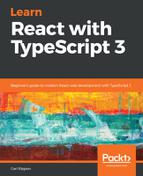We might want to make a property optional because not every situation where the interface is implemented requires it. Let's take the following steps in our OrderDetail interface:
- Let's create an optional property for the date it was added. We specify an optional value by putting a ? at the end of the property name but before the type annotation:
interface OrderDetail {
product: Product;
quantity: number;
dateAdded?: Date,
getTotal(discount: number): number;
}
We'll see that our implementation of this interface, tableOrder, isn't broken. We can choose to add dateAdded to tableOrder but it isn't required.
- We might also want to make a method parameter optional. We do this in a similar way by putting a ? after the parameter name. In our example, let's make discount optional in the OrderDetail interface:
interface OrderDetail {
product: Product;
quantity: number;
dateAdded?: Date,
getTotal(discount?: number): number;
}
- We can change the method implementation signature as well:
getTotal(discount?: number): number {
const priceWithoutDiscount = this.product.unitPrice * this.quantity;
const discountAmount = priceWithoutDiscount * (discount || 0);
return priceWithoutDiscount - discountAmount;
}
We've also dealt with the case when a discount isn't passed into the method by using (discount || 0) in the discountAmount variable assignment.
x || y is shorthand for if x is truthy then use x, otherwise, use y. The following values are falsy values: false, 0, "", null, undefined, and NaN. All other values are truthy.
- With our optional parameter in place, we can call getTotal without passing a value for the discount parameter:
tableOrder.getTotal()
The preceding line doesn't upset the TypeScript compiler.
